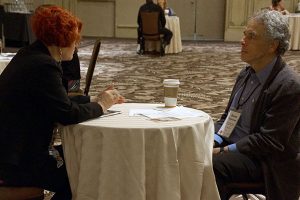
David Corcoran, who as editor of the New York Times’s weekly science section was a fixture at AHCJ’s annual Freelance PitchFest, died Aug. 4 at his home in New Mexico. The cause of death was leukemia, said his wife, Bonnie Stetson. He was 72.
Corcoran was a well-loved editor during 26 years at the Times. He moved there after nearly two decades at The Record in northern New Jersey, where he wrote an opinion column and edited the editorial page. At the Times, he ascended quickly, starting as a copy editor and eventually working on the weekend, OpEd, graphics, New Jersey and education desks before leading the Science Times section, from which he retired in 2014.
He then moved to Cambridge to become associate director of the Knight Science Journalism Program at MIT, where he launched the “Undark” podcast and mentored research fellows and science writers.
“He was a supremely graceful writer and a meticulous and insightful editor, the last of a breed of editor/scholars with a gentle touch and a literary gift” said Charles Strum, a retired associate managing editor at the Times who was Corcoran’s friend and colleague for 48 years.

A man of many parts, Corcoran was a published poet, a restaurant critic who wrote more than 250 reviews of New Jersey restaurants, a podcast pioneer, the linchpin for a network of Times and Record alumni, an avid runner and a baseball fan.
At the Times and in his many interactions as an editor, instructor, and champion of young journalists, Corcoran was remembered as both joyful and generous.
“He could cut through to the heart of things,” said Alan Finder, a colleague at both newspapers, “but he always did it in a gentle way.”
After Corcoran’s diagnosis last September, a former colleague at the Times circulated an informal newsletter about his condition among his friends. Many treatments were tried, including a clinical trial as recently as July.
But his strain of acute myeloid leukemia was particularly aggressive, said Stetson. Corcoran returned to their home with a view of the mountains, and died peacefully Sunday evening, she said.
“The main thing about David is, he was the most considerate person in the world,” said Stetson, a school psychologist with whom he reconnected in recent years. “He just took care of people. He took care of me until his last breath.”
A memorial service will be planned later this year in Nyack, N.Y., where Corcoran grew up, Stetson said.
- Farewell David Corcoran, Dearest of Editors, by Christie Aschwanden
- Remembering David Corcoran, Veteran Journalist and KSJ Family Member, by Tom Zeller Jr.
- A 2017 AHCJ webcast, “Mastering the art of the pitch,” featured advice from Corcoran
- Corcoran’s advice on “getting editors to bite” was featured in a 2013 blog post
- He again offered advice during a 2014 panel about what editors want from freelancers
- A Day in the Life of David Corcoran, The Open Notebook
I spent a fair amount of time in @dacorc‘s office last year working on my thesis. He was, without a doubt, the best thesis adviser in the GPSW program. He was patient, encouraging and a great editor. I am a better reporter because of him. https://t.co/pJeRkZdYqL
— Heather S. Mongilio (@HMongilio) August 5, 2019
What a loss. @dacorc was the first major editor to take a chance on me, and the kindest editor I’ve had since. He talked me through my pitch on the phone, helped me through thorny reporting issues, and delivered whipsmart edits. I was sad when he retired, and even sadder now. https://t.co/2EHm0wxC9o
— Tim Requarth (@timrequarth) August 5, 2019
I received my first assignment from David for the @nytimes at an @healthreporters pitchfest. He was kind and generous with his time. Always encouraging and when you left New York Times I kept up with him when he moved to Cambridge. My condolences to his family.
— David Levine (@Dlloydlevine) August 5, 2019
Sad news. I briefly worked with David at the Times, and every word of this tribute rings true. Thanks @cragcrest, for sharing. https://t.co/Yl8PqwgSr2
— Alicia Ault (@aliciaault) August 5, 2019
RIP, @dacorc. You will be missed by science and health journalists, and the world. An observance by @cragcrest. https://t.co/6WOYgQjSTq
— Ivan Oransky (@ivanoransky) August 5, 2019






